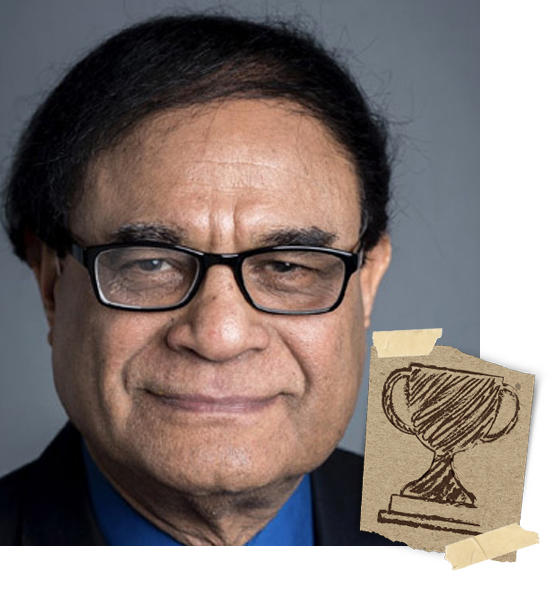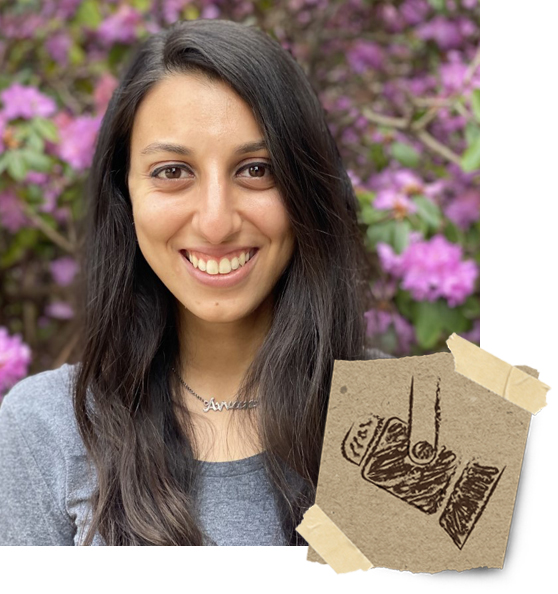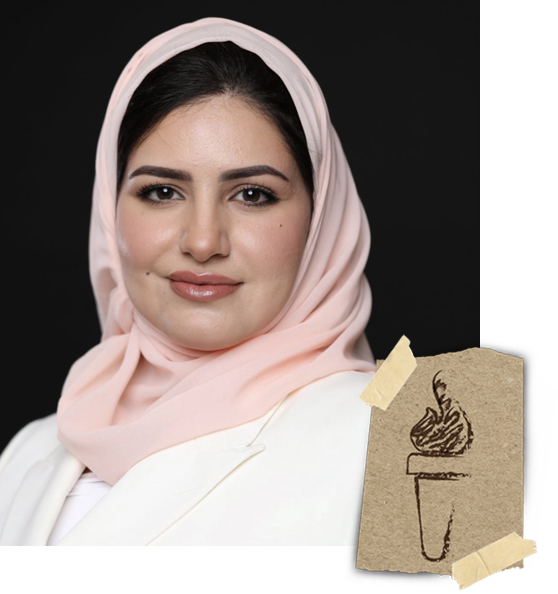Access Champion: Dr. Fayyaz Hussain
April 11, 2025 - Emily Jodway
 During the month of April, we celebrate Arab American Heritage Month. This includes the recognition of the numerous cultural and societal contributions that Arab-Americans have brought to our country, as well as those who conduct research, educate, and promote activism in the Arab-American community.
During the month of April, we celebrate Arab American Heritage Month. This includes the recognition of the numerous cultural and societal contributions that Arab-Americans have brought to our country, as well as those who conduct research, educate, and promote activism in the Arab-American community.
Our Access Champion this month is Dr. Fayyaz Hussain, a professor of Integrative Studies in Social Science who has been teaching at Michigan State for over 30 years. Dr. Hussain is dedicated to his work both in the classroom and around the world. He has taught over 50,000 students in a variety of subjects, from introductory sociology courses to examinations of social inequality and global diversity. His research also stretches across a broad sociological scope, but most recently has centered around gender-based violence and women’s issues in Pakistan.
Hussain was born and raised in Pakistan by parents who had migrated over from nearby India. He describes his upbringing by his hardworking and dedicated parents as a struggle. As a successful student, he earned scholarships and financial aid that enabled him to earn his bachelor’s and master’s degrees at Punjab University in Pakistan.
Hussain sought to earn his PhD at a university outside of Pakistan, but financial support continued to hold him back. After brief stints teaching in Pakistan and then Nigeria, with a decent amount of money saved up he made his way overseas to Canada, where he earned a master’s in Sociology from University of Guelph, earning a living and paying tuition via his job as a teaching assistant.
Eager to continue his academic journey, he began applying for PhD programs, ultimately receiving admission and an offer of waived tuition from Michigan State. “I crossed the border through Windsor from Canada to the US, with just 350 dollars in my pocket,” he said. “No other money.”
Hussain began working part-time at the library to help cover his food and cost of living expenses, and his hard work in the classroom eventually paid off- as one of the top scholars in the sociology department, he earned a research and teaching assistant position.
Hussain’s interest in sociology originally started when his brother back in Pakistan recommended it as a good field of study, and has only grown since then. His love of sociology and social science, as well as educating students on subjects surrounding these areas, is apparent in everything he does.
“I really developed an emotional attachment to it, because I’ve been teaching sociology and social science courses in integrative studies ever since then,” he said. “And, oh, I love it. I teach 700 students each semester, and I enjoy it every time. I’ve taught more than 50,000 students at MSU and I still love it.”
One of the things Hussain loves most about teaching is being able to encounter and educate students from a variety of fields, many of whom take his classes as a prerequisite or out of a general interest and have no background in sociology. He enjoys the challenge of shifting the mindsets of his students who may see these classes as just a means to an end.
“I say, ‘Look, if you are a doctor or a physicist … wherever you go, you interact and communicate and deal with human beings, and these courses in general education teach you about these people and their social issues,’” he explained.
The incorporation of stories and storytelling is one way that he tries to add more of an interest at the human level to his courses. Students often find these, as well as his classes and personality in general, very memorable. He mentions running into students quite literally around the world- from a student-turned-doctor he encountered in a local hospital to a group of students who approached him on a crowded street in Germany after a football game.
The field of sociology greatly involves the usage of active, service-based research, of doing work out in the community with real-life individuals to better understand human behavior, social relationships and our multifaceted interactions with society and culture. This, Hussain says, is exactly why he fits into the study of sociology so well.
“To me, individual, community, and society are a lot more important than doing research in the lab. That’s why I love it. You can really make a difference in the lives of individuals, and not only individuals- if you can generate that spirit among students, ultimately, they can make a difference wherever they are, too.”
Aside from his many students, one of the things Hussain loves most about Michigan State is its inclusive environment. “I’m not exaggerating, this is such an inclusive place,” he said. “I came here as a student in 1986, and in my 40 years here there has not been a single time when I felt like I was treated as an outsider, harassed or picked on. This is a lot like a family.”
His welcoming reception when he first stepped on campus, in addition to the help he received early on from his professors and mentors, have inspired him throughout his life to give back in his own way. He describes that initial graduate assistantship offer as a favor that he continues to repay all these years later. Hussain established an undergraduate scholarship for integrative studies students here at MSU. He also regularly contributes to the athletics department. Hussain additionally created a fund in partnership with the North Central Sociological Association, of which he currently serves as president. In 2021-2022, he created another fund for faculty recipients of the Distinguished Teaching Award to continue their research.
Hussain is also very passionate about giving back and staying involved with his home country of Pakistan. In 2019, he donated more than $25,000 to his former school after traveling back home for a visit and discovering that many of the classes were being held outside with no means of shelter. He partnered with a friend, Dr. Kazmi from Scotland, to raise the money and build four new classrooms. “After they were completed, the students of the school invited my family, and some of my old students were there, and we had a big celebration,” he added.
In addition to this, Hussain spent time in Pakistan in 2024 on a Fulbright Fellowship researching violence against women in Pakistan, interviewing women in shelter homes and chronicling their harrowing experiences. He also taught undergraduate courses on social inequality at Quaid e Azam University, and held a two-week workshop training social welfare professionals, federal employees and volunteer organizations on how to better serve women impacted by violence. He will be returning next summer to complete his research and teaching.
“It was a very good experience,” he said. “The students loved it. I was so busy giving presentations and seminars at different universities; before that, I hadn’t mentioned that I work at MSU, and once they found out, suddenly they all wanted me to visit their university!”
Hussain’s work is far from being done, and he doesn’t plan on slowing down any time soon. He experienced a great number of barriers to entry when returning to Pakistan for his research, including discouragement from officials who refused to assist him in receiving the necessary paperwork to work and travel within Pakistan, claiming that the research he does presents Pakistan in a negative light.
“I was told, ‘You are defaming Pakistan by writing about it being a country where violence against women is a continuous problem,’” Hussain explained. “They don’t want people to know. I mean, just imagine. So that got me even more motivated to do this research.”
Gender-based incidents of violence are just one of the many issues that are at play when tackling the challenges surrounding discrimination and fostering inclusivity in America. Individuals in this country from different races, ethnic groups, religions and gender identities face issues of prejudice every day, and it is up to us to stand up for these individuals and create a more inclusive society.
“It took years to create a more inclusive America, and now everybody and everything is at stake again,” said Hussain. “It’s not a small issue, and it’s not just happening here. It’s happening in countries all over Europe, and at different magnitudes. So to stand up and fight against those kinds of forces, it’s not easy. It’s like a wave, and we have to live with that wave, and ultimately we will of course go back to a more inclusive society, but right now, it’s a challenge.”
Honorees’ views are their own and do not necessarily reflect those of the College of Social Science.
Read more:

Access Spotlight
Alumni
Avvan Sanjana
Our April Access Spotlight is on Avvan Sanjana, a licensed therapist who supports students through her work at the MSU Center for Survivors.

Access Torch
Student
Abeer Alanazi
Abeer Alanazi, a PhD student in the Department of Geography, Environment, and Spatial Sciences whose research focuses on renewable energy and environmental sustainability in Saudi Arabia and the United States, is our April Access Torch.

Access Matters
We strive to cultivate an inclusive and welcoming college environment that celebrates a diversity of people, ideas, and perspectives.

